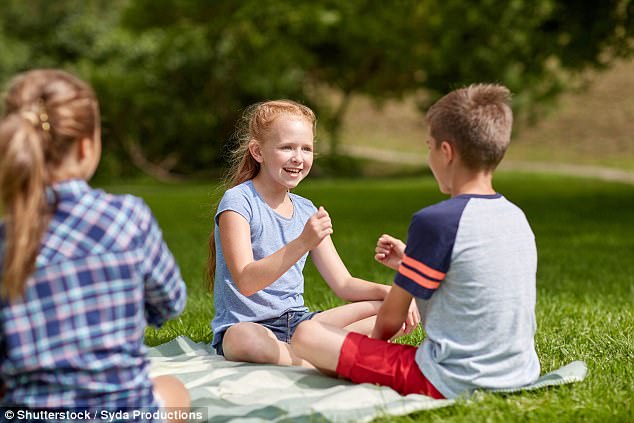Schools are told to stop kids using the term which makes classmates feel left out
 Schools around the world are banning the term ‘best friends,’ stopping children from naming their favorite buddy in a bid to ensure classmates don’t feel left out.
Schools around the world are banning the term ‘best friends,’ stopping children from naming their favorite buddy in a bid to ensure classmates don’t feel left out.
A New York psychologist says the trend that started in London is now spreading across the US.
‘The idea of banning the phrase “best friends” is a very intriguing social experiment,’ clinical psychologist Dr. Barbara Greenberg tells CBS in New York.
‘Let’s face it, you can’t ban somebody from having a close relationship, and you can’t really ban somebody from having a best friend but what the schools are trying to do is foster the idea of kids having more than a single friend,’ Greenberg says.
The movement, which is believed to have started in Prince George’s school in South London, isn’t intended to discourage intimate friendships, but rather encourage more inclusivity, Greenberg says.
The idea is to increase the number of interactions a student may have with different members of his or her peer group.
It’s now garnered support from educators in America, Greenberg says, who is licensed to practice psychology in both Connecticut and New York, and personally believes the rationale behind the notion is strong.
‘I see kids come in all week long who are feeling dreadful because they are excluded and because they are either nobody’s best friend or their best friend has moved on,’ Greenberg says.
Jay Jacobs, who operates Timber Lake Camp in New York, stresses the downside of not fostering multiple relationships at a young age, for exactly that reason.
‘I think that there are pitfalls in just having one friend,’ Jacobs says. ‘Remember as you grow up, interests change, children go in different directions.’
Jacobs adds that counselors at Timber Lake, which alternates in location between Glen Cove in Winter and Shandake in Summer, have made it a point to promote a more inclusive environment for years.
His philosophy is that children will be better set up for success later in life if they get used to having a wider friend group at a young age.
‘You can’t be on the soccer field and just be dealing with one child, they’re going to be interacting with a team,’ Jacobs says.
‘It’s about promoting kindness, looking to children to be kind to one another and to be aware of what it looks like when you’re not.’
Written by Stephanie Haney and published by The Daily Mail ~ February 13, 2018
 FAIR USE NOTICE: This site contains copyrighted material the use of which has not always been specifically authorized by the copyright owner. We are making such material available in our efforts to advance understanding of environmental, political, human rights, economic, democracy, scientific, and social justice issues, etc. We believe this constitutes a ‘fair use’ of any such copyrighted material as provided for in section 107 of the US Copyright Law. In accordance with Title 17 U. S. C. Section 107, the material on this site is distributed without profit to those who have expressed a prior interest in receiving the included information for research and educational purposes. For more information go to: http://www.law.cornell.edu/uscode/17/107.shtml
FAIR USE NOTICE: This site contains copyrighted material the use of which has not always been specifically authorized by the copyright owner. We are making such material available in our efforts to advance understanding of environmental, political, human rights, economic, democracy, scientific, and social justice issues, etc. We believe this constitutes a ‘fair use’ of any such copyrighted material as provided for in section 107 of the US Copyright Law. In accordance with Title 17 U. S. C. Section 107, the material on this site is distributed without profit to those who have expressed a prior interest in receiving the included information for research and educational purposes. For more information go to: http://www.law.cornell.edu/uscode/17/107.shtml
